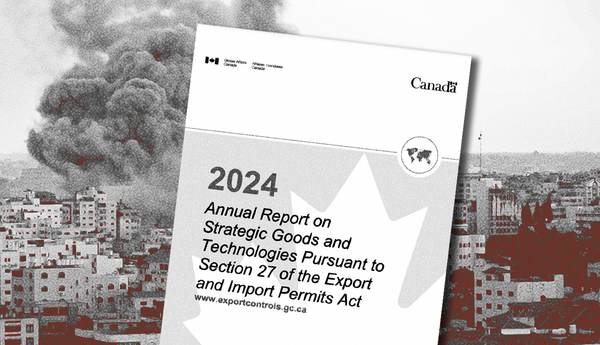Teresa Ganna has been involved in running a meal program at the Trinity United Church in Newmarket, Ontario for 20 years. Before the pandemic, volunteers would welcome around 35 guests for a meal on a typical night.
More recently, however, the number of people needing something to eat has risen at a troubling rate.
“We're seeing the numbers rising really a lot amongst people in the community that just simply don't have food,” Ganna told The Maple. “This is really alarming to me.”
Ganna had retired from her volunteer work, but recently returned to help deal with the steadily rising volume of those needing the meal program. More than a hundred guests now regularly visit the church for takeout meals.
Ganna is worried about how much more the problem could worsen as soaring food costs are driven by a push for ever higher profits in the corporate grocery chains at a time of intersecting crises. With more and more hungry people, she wonders whether the church program will have the capacity to meet community needs.
Recent visitors have included regulars, but also new faces. “What's alarming to me also is the number of families, people with children,” Ganna explained. “It means that there are children going hungry.”
She estimated that during last week’s meal service, seven families and 36 couples came to get food. Sometimes one person will visit the church to pick up a meal for their family, or for disabled people who can’t leave their home. Many visitors are also homeless.
“With the price of food going up, it's affecting these people even more,” said Ganna. “If they are living on a very limited income, they've got a lot less to spend on food. They can't absorb that extra cost.”
As we noted in yesterday’s article, the most recent Consumer Price Index (CPI) update showed that Canadians paid 9.7 per cent more for food purchased from grocery stores in April than they did in April 2021, with costs for basics like bread going up by 12.2 per cent.
Shelter costs are also on the rise. Newmarket is part of York region, which is considered “severely unaffordable” for those on low incomes, according to the Canadian Rental Housing Index. Those making between $25,000 and $47,000 per year in the region have to spend around 40 per cent of their income for a one-bedroom apartment.
However, Ganna noted that many of those on low and fixed incomes have to rent rooms rather than full suites, meaning they sometimes don’t even have access to a kitchen. “So what are they supposed to do?,” she said.
Seeing people struggle to afford something as basic as food is upsetting to Ganna. “They don't deserve to be having to go to a church to ask for a meal,” she explained.
“The rates of social assistance have to be higher. People are not getting enough assistance and it's having a whole knock on effect all through the economy.”
Benefits fall far behind
Edward, who resides in London, Ontario and requested that his full name be withheld, knows firsthand how inadequate social assistance payments make life a daily struggle. He has lived on disability benefits for 15 years and has experienced homelessness several times during his adult life.
“I've been struggling essentially since I've been on this system,” Edward told The Maple. He explained that while his income is stable, it is not sufficient.
Edward was told that the stability provided by the benefit would relieve stress, as he has a schizoaffective diagnosis. But this has not been the case.
Edward receives the Ontario Disability Support Program (ODSP), which includes a shelter allowance capped at $497 per month. Finding a room to rent for less than $500 is impossible, he explained, meaning that additional funds from the “basic needs” portion of the benefit must also be used to pay for shelter.
That means he has even less money for food and other necessities. Thanks to the rising cost of groceries, said Edward, “what used to barely get me through until the end of the month now barely gets me halfway through the month.”
He said he is “not even close” to being able to afford sufficient amounts of nutritional food each month. Edward added that he has been waiting for over a month to hear back from his case worker after he requested assistance during this particularly difficult time.
Mike Harris’ Progressive Conservative government slashed welfare rates by more than 20 per cent in 1995. Edward said that small increases under succeeding governments over the past 27 years have amounted to a drop in the bucket.
Adjusted for inflation, ODSP rates, which are capped at $1,169 per month for a single person, are lower now than they were on Harris’ last day in office in 2002. Premier Doug Ford has promised to increase payments by five per cent, an amount that would still leave ODSP recipients well below the poverty line.
Edward doubts the promised increase will even happen. “I think [Ford is] lying,” he explained. “He's lied about so many other things. Why would this be any different?”
Besides, Edward continued, “a little five per cent increase here and there is not going to cut it.”
“[The government] is completely failing people in need in this province.”
He explained that the ODSP system relies on volunteer-run food banks and soup kitchens to feed recipients because they don’t receive enough money through the benefit to cover food and shelter.
“This is part of the ODSP plan,” said Edward. “When you go and apply for ODSP, they will give you a food calendar.”
The food offered by various programs are not nutritious, he added. “It will keep you alive, but it's certainly not like good food.”
“They're working with donations, so a lot of it is soup, sandwiches, that kind of stuff.”
Ganna agrees that all levels of government, as well as private companies, rely on volunteers to compensate for underfunded social support systems and poor wages.
“The government [and] large corporations who employ people, they rely on volunteers to pick up the slack,” she said. “They rely on volunteers to take care of people.”
Ganna explained further that because volunteer organizations provide support to people on insufficient fixed incomes or poverty-level wages, the volunteers are, in effect, used to subsidize large corporations who refuse to pay their workers appropriately while enjoying relatively low tax rates.
As we noted in yesterday’s article, large corporations have seen operating surpluses rise 2.8 per cent during the pandemic recession. In particular, supermarket chains have generated big profits on the back of soaring food costs, with major corporate chains like Empire boasting of an “outstanding quarter” in recent reports.
In an effort to inflate their profit margins, these corporations have significantly contributed to the cost of living crisis for millions of Canadians.
What needs to change?
In terms of why people do not advocate or vote for political parties promising to deliver adequate benefits, Edward said he is unsure if the public has a clear understanding of how disability benefits work, or if they do understand and simply don’t care.
“It does seem to be kind of prevalent that there's this resentment towards people on disability because it's interpreted that we're getting ‘free money’ or ‘money for nothing,’” he explained. “There's no consideration for why that person is on disability in the first place.”
Edward has little faith in politicians’ willingness to address the issue.
“They're there to implement the will of the people, and that whole idea, that whole concept has been lost,” he said.
Ganna said she believes a program like a universal basic income that ensures a decent and dignified life for all Canadians would alleviate many of the devastating pressures caused by poverty.
“If people are not eating properly, they're not healthy, and they may end up in problems with the police,” she explained.
But despite social workers and other professionals who understand the situation repeatedly raising concerns about the inadequacy of existing programs, nothing is done to correct the situation, said Ganna.
“The folks are still living on insufficient income and are unable to buy their own food,” she explained. “I just don't know what else we can do.”
Alex Cosh is the managing editor of The Maple.
Edited by John Young.







